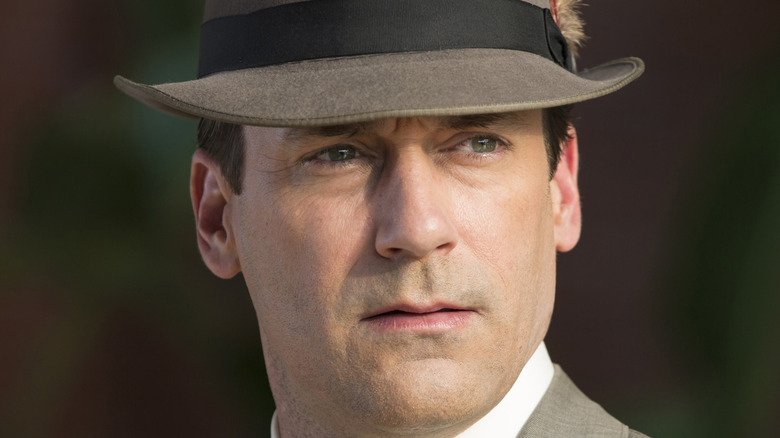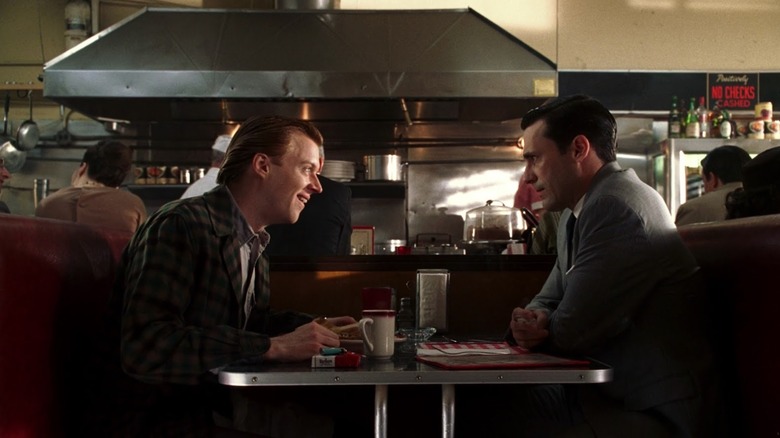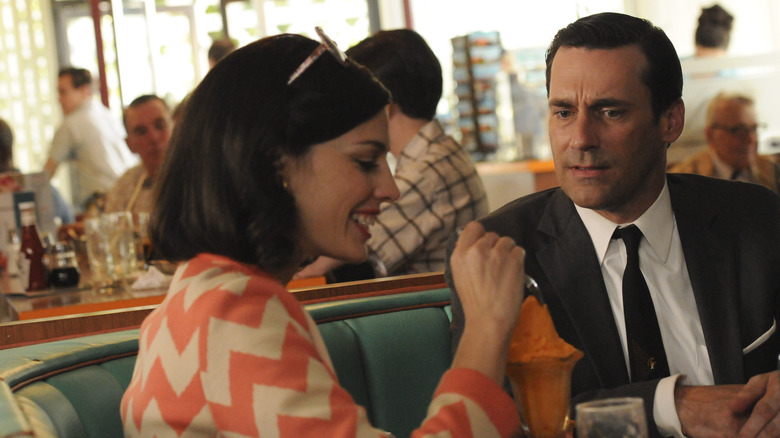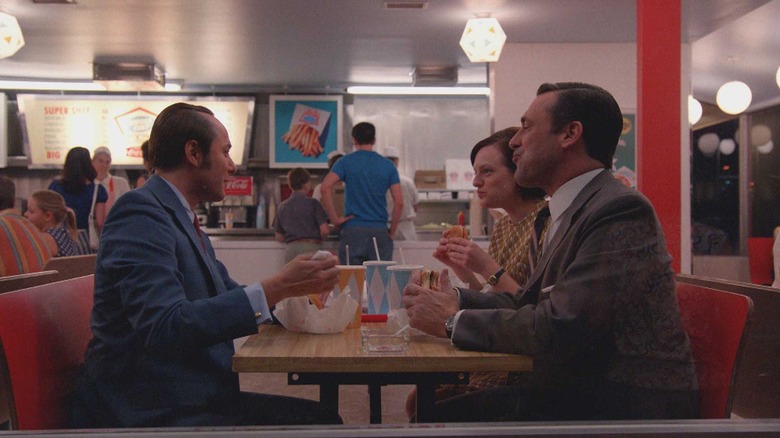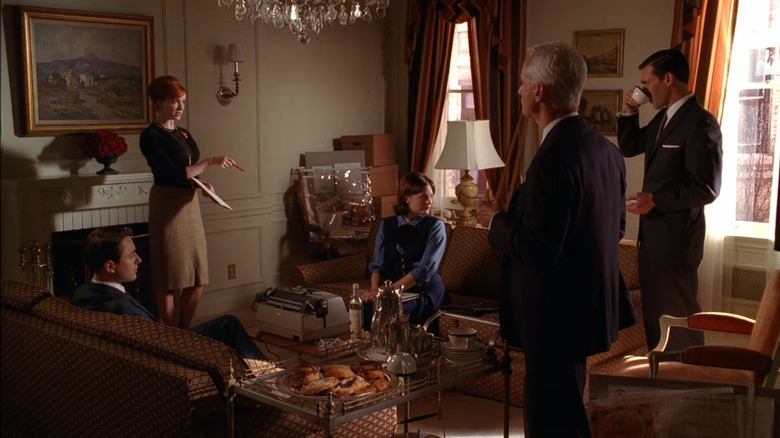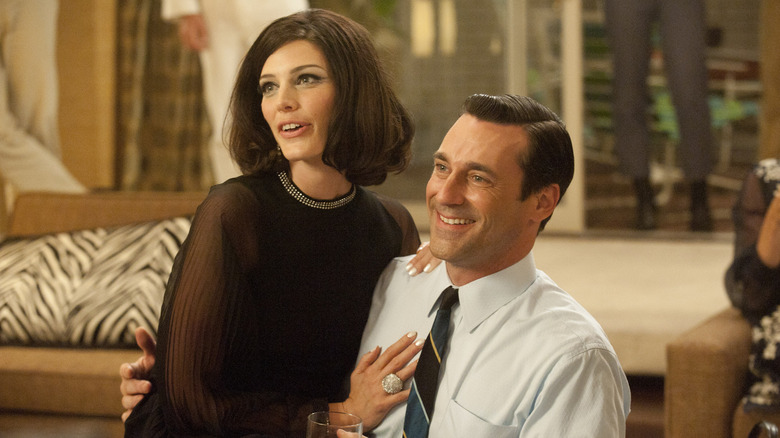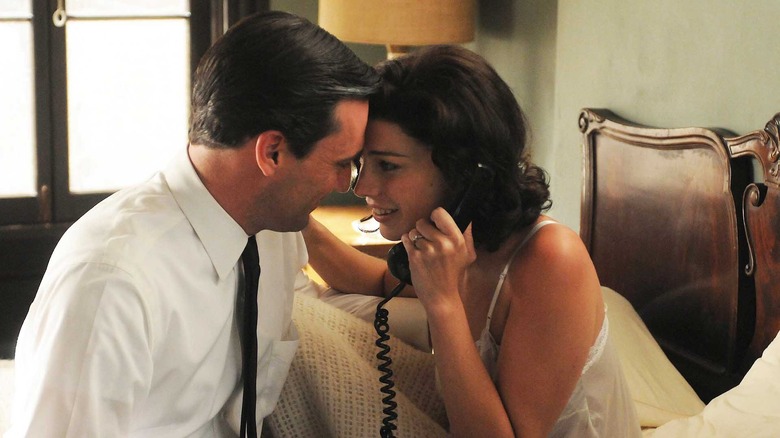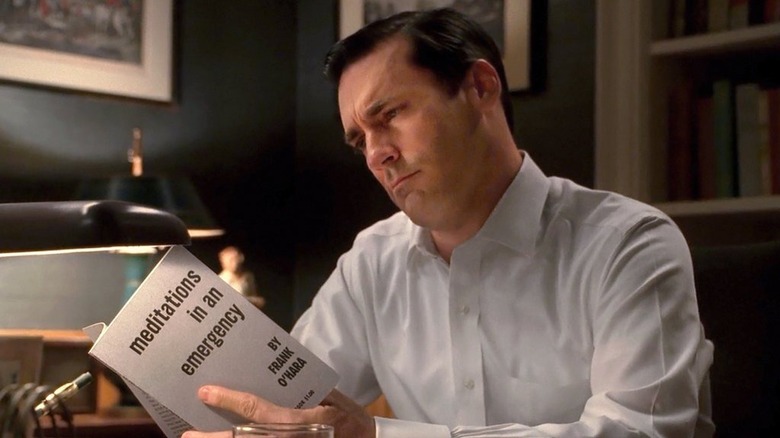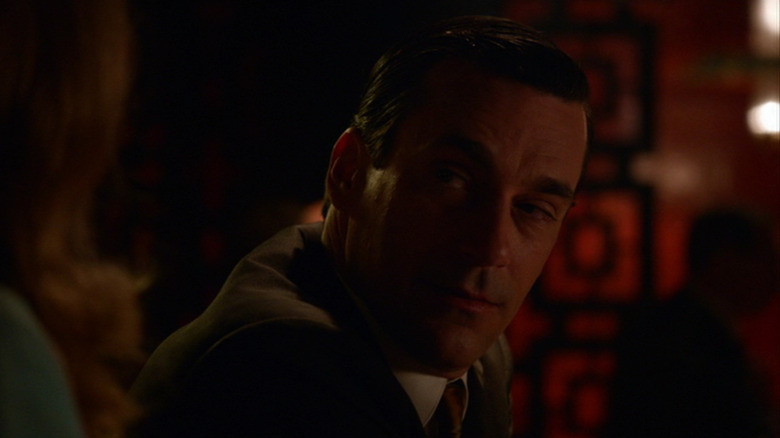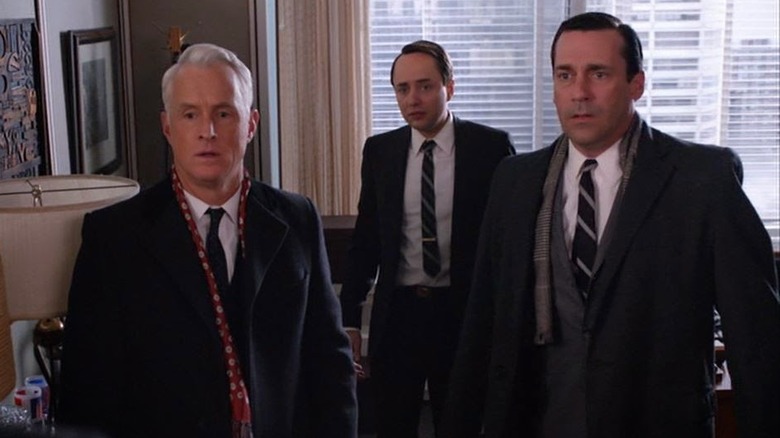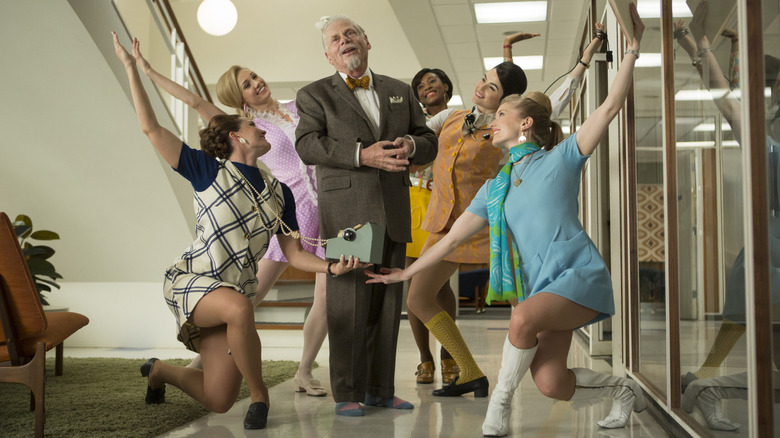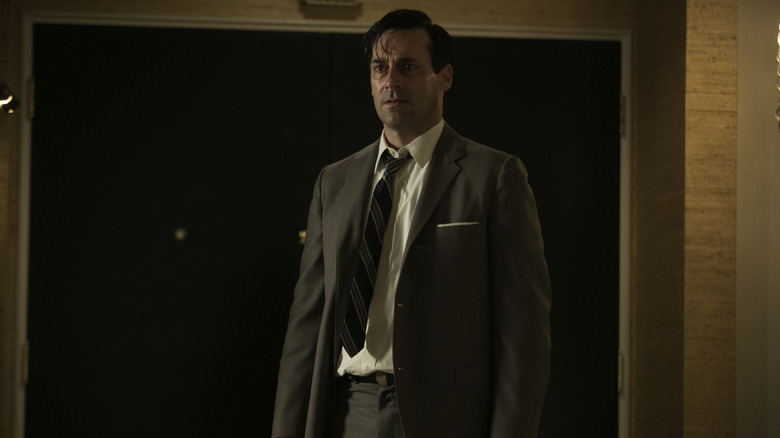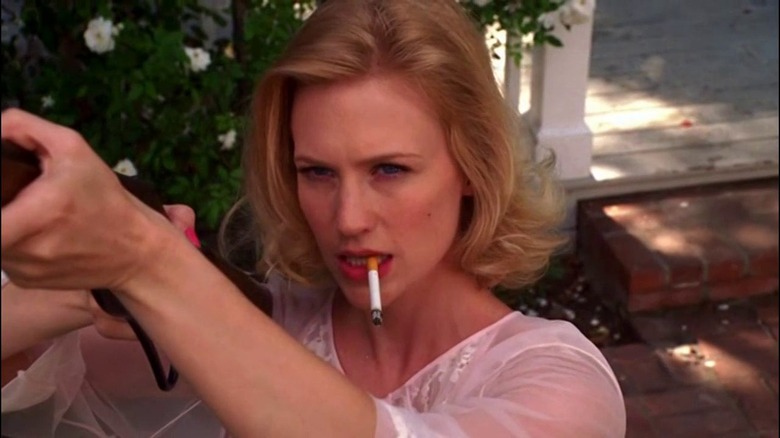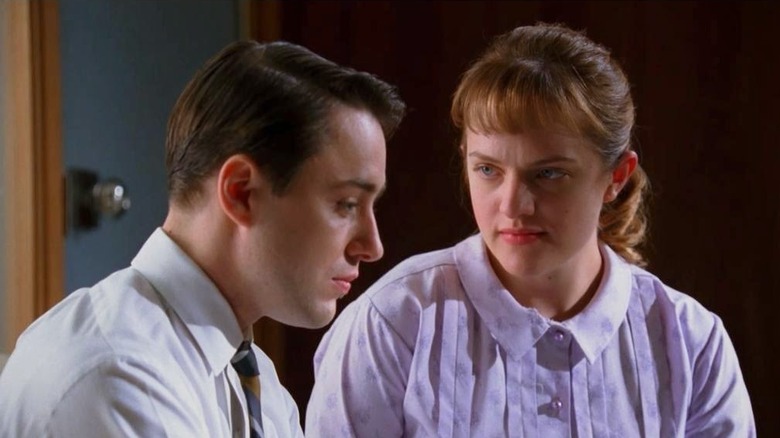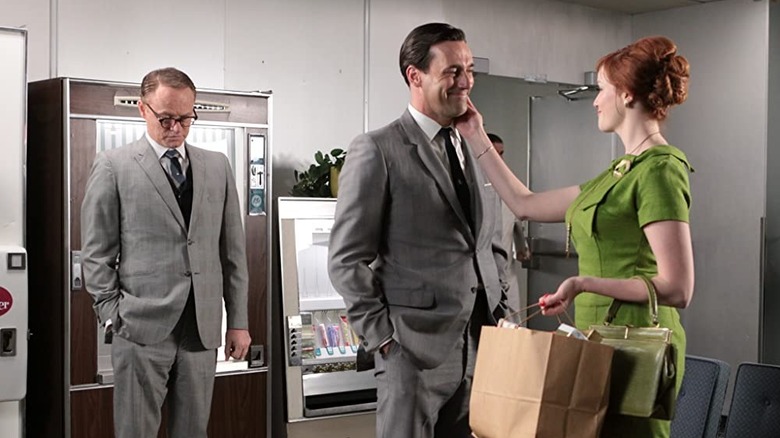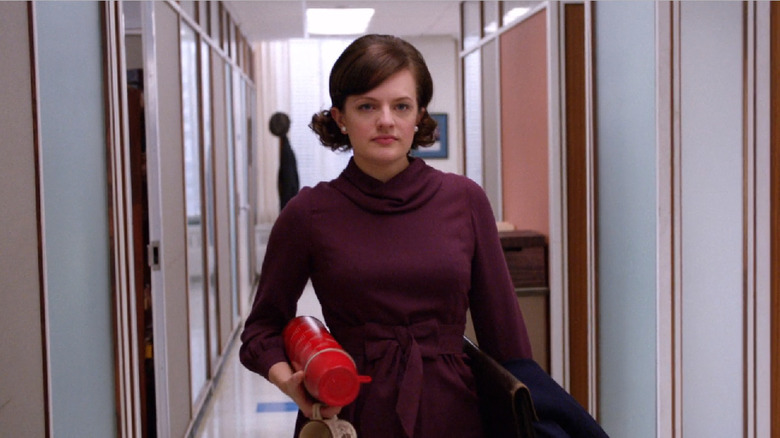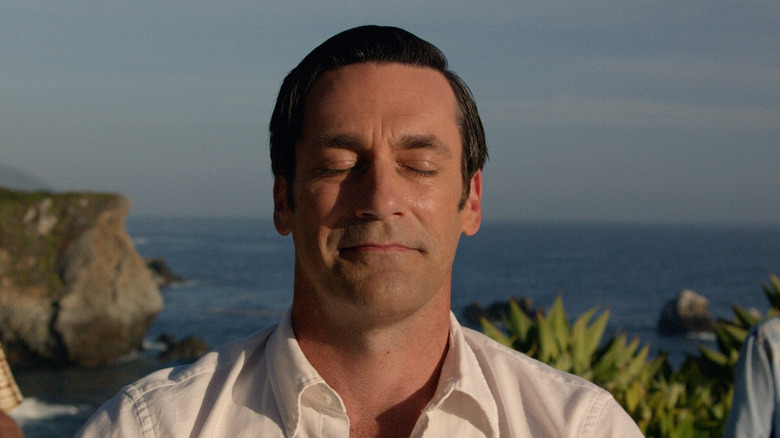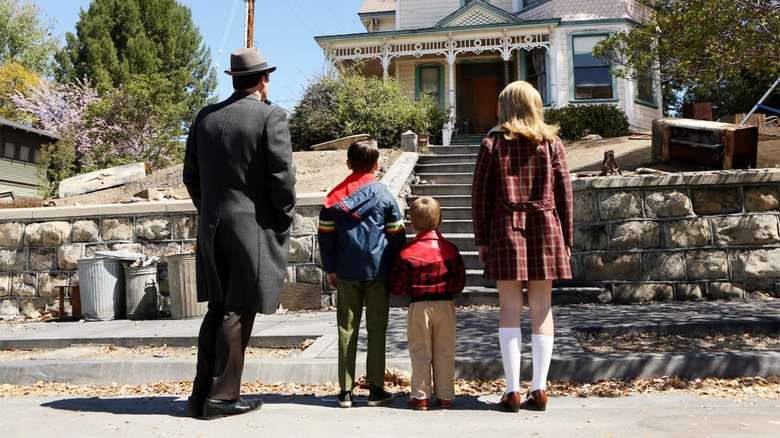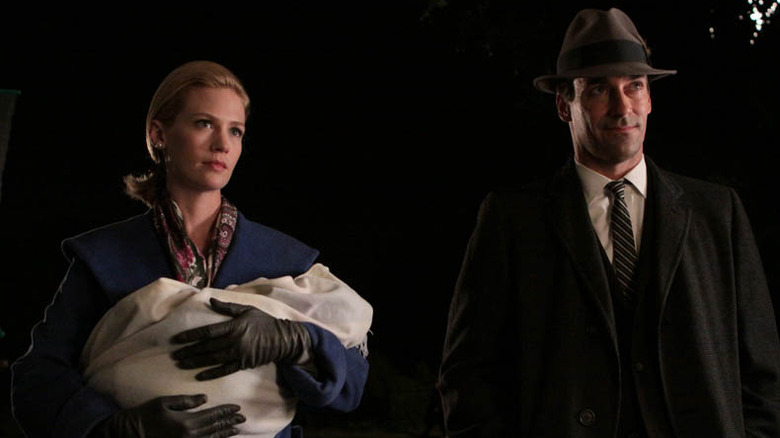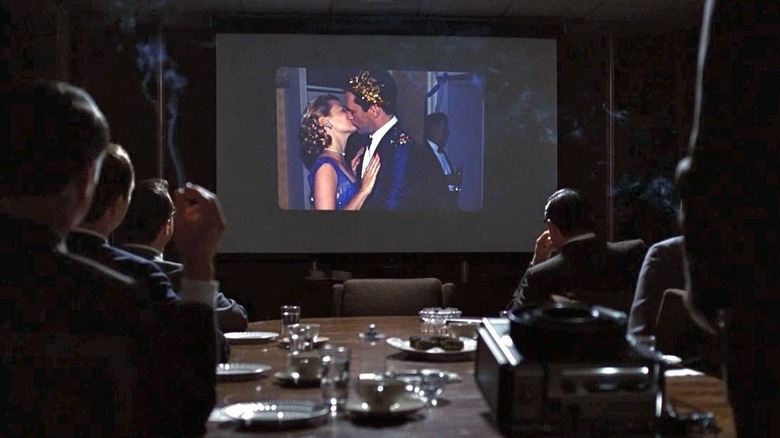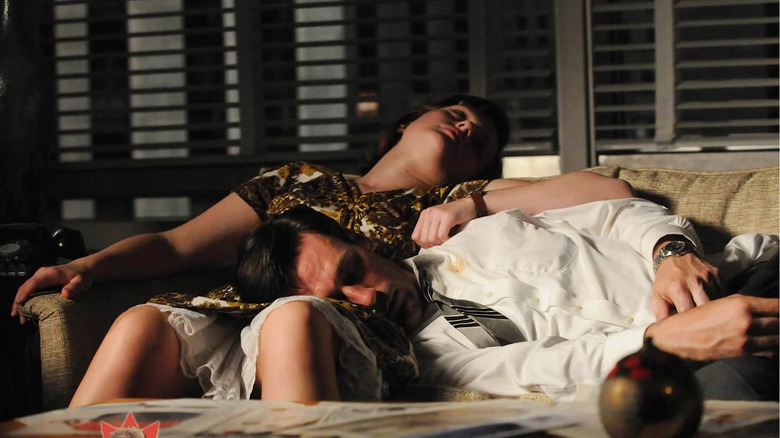The 20 Best Episodes Of Mad Men
Premiering on July 19, 2007, Matthew Weiner's "Mad Men" is one of the finest dramas in television history. Much like "The Sopranos" and "Breaking Bad," it follows an American male anti-hero torn between his familial duties and occupation. Jon Hamm delivers a career-defining performance as Don Draper, an ad man who struggles to balance the temptations around him (and his many vices) with interpersonal relationships and responsibilities.
Over the course of a single decade, we explore his life as a top Madison Avenue advertising executive. Despite his handsome charms and creative innovation, he is haunted by his checkered past. "Mad Men" steadily uncovers how his humble rural beginnings as Dick Whitman drove him to alcoholism and serial infidelity as an adult. An incredible ensemble of actors including John Slattery, Elisabeth Moss, January Jones, help shape this fascinating world set in the 1960s, one of the most pivotal decades in United States history. Although it's difficult to choose from so many extraordinary episodes, here are the best 20 across all seven seasons.
20. 5G (season 1, episode 5)
The way the first season gradually reveals the truth behind Don Draper's past and real name is captivating — especially when you're watching for the first time. In "5G," we learn that Dick Whitman had a half brother named Adam. He finds Don at Sterling Cooper, not understanding what led his sibling to such a prominent position with a new name. Adam's wide-eyed innocence and affection makes it even more crushing when Don rejects him, giving him $5,000 to leave New York and never contact him again. It's a decision that will continue to haunt Don throughout the series because it is a major factor in Adam's tragic death.
"5G" is a small but pivotal piece in the Don Draper/Dick Whitman puzzle that steadily builds its tension. The episode is one of the best in the series because it carefully uncovers Dick Whitman's origins without giving away too much. As the perfect image Don Draper presents to the world starts to crack, this revelatory episode leads the audience to question everything they know about him and anticipate learning more.
19. Far Away Places (season 5, episode 6)
Orange sherbert has never been so controversial as in "Far Away Places." From director Scott Hornbacher, the season 5 episode focuses on several characters going on some very bad trips in a single day. Its jumbled timeline and dreamlike visuals are discomforting and make it a trippy episode to watch. Don abandons Megan at a Howard Johnson's and when he returns to New York, they engage in a sadistic fight where Don chases her around their apartment. Roger and Jane take LSD, which results in a hilarious sequence where Roger imagines his hair looks like a famous half-gray-half-black hair dye ad, and ends with an epiphany that they should divorce. "Far Away Places" mixes wacky humor and uncanniness in a clever way. The psychedelic imagery and editing style add a sense of foreboding to the carefree moments before everything descends into intense darkness, making it one of the most unique episodes in the "Mad Men" canon.
18. The Strategy (season 7, episode 6)
"The Strategy" is about the family you create, not the one you are born into. This final shot of the Sterling Cooper co-workers, friends, and confidants sharing a wholesome meal in a brightly-lit restaurant evokes what Entertainment Weekly calls "a living Edward Hopper painting of a very non-traditional family." The season 7 episode also serves as a strong companion piece to "The Suitcase" in its intimate exploration of Peggy and Don's unique relationship. While they struggle to make the new Burger Chef campaign about something more than just nuclear families, they share a tender moment dancing to Frank Sinatra's "My Way." As part of the final season, "The Strategy" celebrates the core relationships that make "Mad Men" such a fascinating series to watch. This warmhearted episode honors how far these workaholic characters have come and the strong connections they've built in both their professional and personal lives.
17. Shut the Door, Have a Seat (season 3, episode 13)
Matthew Weiner ends his third season on a bold note by completely turning Don Draper's world upside down. The final episode depicts business dealings with a thrilling panache when McCann Erickson purchases Puttnam, Powell, and Lowe along with Sterling Cooper. Refusing to be under their thumb, Don ingeniously maneuvers a rebirth as Sterling Cooper Draper Pryce with the company's essential people. In the final montage, we see Don arriving at his new downtown Manhattan apartment and Betty, her new beau Henry, and baby Gene flying to Reno to get a divorce.
"Shahdaroba" plays in the background, and Roy Orbison optimistically croons, "the future is much better than the past," which we can only hope is true. It's exhilarating to see the characters band together and start another company from the ground up, as well as Don trading suburbia for the city life. This whirlwind finale keeps viewers on their toes; they have no idea what to expect for the next season, but it's clear that nothing will ever be the same again.
16. A Little Kiss (season 5, episodes 1 and 2)
Three words: "Zou Bisou Bisou." The season 5 two-part opener includes one of the series' most memorable scenes and songs. Despite his hatred of birthdays (he never had any growing up and the whole stolen identity thing makes them a bit complicated), Megan throws a big surprise party for Don's 40th. She sensually dances to a coy French song, "Zou Bisou Bisou." The performance becomes a running office joke and, outside of the show, a cultural touchstone.
This episode stands out because it establishes Don's new married life in the city — Don and Megan's modern apartment and amalgamated work and married life, and his attempt to live on the strait and narrow. Right away, the audience becomes subtly aware that Megan, unlike Betty, already knows about her husband's past and false identity. "A Little Kiss" is fun, humorous, and has a vivid style. It shows Don in a whole new light. But there's a whisper of the cracks that will break Megan and Don's union by the end of the series.
15. Tomorrowland (season 4, episode 13)
"Tomorrowland" is the happiest place on earth and traveling there makes Don believe he can start over. In the wake of his divorce, Don circles rock bottom by sleeping with various prostitutes, emotionally wounding his naive secretary, blacking out in his lonely apartment, and more. He takes his new secretary Megan — who has only appeared tangentially throughout the season — on a business trip to California to help watch his children at Disneyland. Megan is his light at the end of the tunnel, a veritable Maria Von Trapp who doesn't get angry when his kids spill a milkshake.
Don throws a major curveball at the end of the episode by swiftly breaking up with his girlfriend Faye and proposing to Megan with Anna's wedding ring, rejecting Faye's dominant, independent qualities for Megan's maternal warmth. This surprise makes "Tomorrowland" one of the most unforgettable episodes in the series. The inclusion of the rosy "I Got You Babe" by Sonny and Cher in the final scene feels disconcerting against the shot of Don staring pensively out the window while Megan sleeps beside him. It leaves viewers waiting on bated breath to see what the outcome of this hasty engagement will be. The finale illustrates how Don is very much an Ouroboros figure, continually self-sabotaging and making the same mistakes by searching for human connection in all the wrong places.
14. Meditations in an Emergency (season 2, episode 13)
The terrifying uncertainty of the Cuban Missile Crisis overlays this gloomy episode in season 2. "Meditations in an Emergency" is a great example of how "Mad Men" depicts the impact of cultural events on its characters in authentic and nuanced ways. When confronted with the threat of global annihilation, the characters lose their inhibitions and expose parts of their true selves. Betty, pregnant and unhappy with Don, has sex with a stranger in a bar.
Peggy rejects Pete's declaration of true love and confesses, for the very first time, her pregnancy and decision to give away their baby. It's a scene that audiences were anxiously anticipating for the past two seasons, and it masterfully pays off in Elisabeth Moss and Vincent Kartheiser's intense performances. "Meditations in an Emergency" is a chilling episode that puts life's regrets and hopes into sharp perspective. Under the threat of death, these characters question their past in their quest for freedom, from Betty's miserable marriage, Peggy's pursuit of ambition, and Don's refusal to be tied down to a contract.
13. The Phantom (season 5, episode 13)
Don is haunted by the phantoms in his life — especially the parts he played in Lane Pryce and Adam Whitman's deaths. Themes of death and regret weigh heavily in "The Phantom," such as in the scene where Pete meets his lover whose memory has been obliterated by electroshock therapy. With his vacant stare, Vincent Kartheiser delivers a poetic and heart-wrenching monologue where he calls his family life "some temporary bandage on a permanent wound." This episode is notable for showing a broken, private side of Pete that we've never before.
"The Phantom" builds to a vivid ending where Megan's thespian dreams come true. Dressed like a fairytale princess, she stands on an illuminated soundstage for a Butler shoes commercial. Don walks away, leaving behind the diorama and heading into the darkness of his old ways. "You only live twice, one life for yourself, and one for your dreams," Nancy Sinatra sings as the season comes to its bitter close. Don returns to the bar where an attractive woman asks if he is alone. The final image is a close up of his smolder, cutting to black before he can answer. "The Phantom" has a heavy existential dread that separates it from other episodes. Its end sequence is visually striking, leading up to a last shot that packs a powerful punch and builds much anticipation for another season where Don is back to his old ways.
12. Commissions and Fees (season 5, episode 12)
"Mad Men" season 5, episode 12 "Commission and Fees" hits like a ton of bricks because it features the untimely death of the jolly accountant Lane Pryce. Don is forced to fire Layne after he secretly embezzles company funds and forges Don's signature. The entire ensemble nails their portrayal of such a terrifying situation; their slack-jawed reactions to the sight of Lane's body are absolutely devastating — especially Jon Hamm's reaction as Don, who had told Lane that there would be a way for him to start over and create a new life for himself, just like he did.
This episode also contains one of "Mad Men's" most poignant quotes, which Don spits out while trying to win over Dow: "What is happiness? It's a moment before you need more happiness." There is always an insatiable hunger for more, but for many — like Lane — happiness is too elusive. "Commission and Fees" is a potent blend of horror, melancholy, shock, and even black humor. It's the most harrowing episode of the series.
11. Waterloo (season 7, episode 7)
This "Mad Men" episode depicts the characters' reactions to the 1969 moon landing. Don and Peggy watch before their Burger Chef pitch, which Peggy nails the next morning. Sally looks at the moon in a telescope and kisses the nerdy boy who shows it to her. Bert praises the country's victory before he passes away. Meanwhile, the shady Cutler tries to get Don fired for breach of contract until Roger holds a secret meeting with McCann Erickson, negotiating a deal to make SCDP an independent subsidiary of McCann and Roger its president. This makes all of the partners filthy rich and salvages Don's job. It's always a blast to watch the hilarious John Slattery wheeling and dealing as Roger.
The episode closes with a touching send-off to Robert Morse as the eccentric and wise Bert Cooper, all the more poignant now that the actor has sadly passed away. To honor of his famous role in "How to Succeed in Business Without Really Trying," a playful depiction of 1960s corporate America, Morse performs a surreal Broadway dance number with prancing secretaries that warns Don, "The best things in life are free." Jon Hamm's anguished look says it all. "Waterloo" is another fine example of how "Mad Men" interweaves dramatic historical events into the character's lives. The final sequence with Bert Cooper is something completely unexpected, if not a little strange for "Mad Men," but the perfect tribute to Morse's triumphant contribution to the series and theatrical talents.
10. The Crash (season 6, episode 8)
In "The Crash," while the creatives spend the weekend brainstorming a Chevy campaign, Cutler brings in a doctor to inject the creative team with methamphetamines to boost their imagination and energy. The episode becomes a psychedelic mosaic of strange moments where the past folds into the present and nothing feels real — like Ken doing a manic tap dance, or Stan hurtling himself over couches.
The drugs incite pivotal flashbacks that reveal Dick Whitman's Oedipal-themed sexual awakening. We learn that as a young boy, Dick unwillingly lost his virginity to a prostitute who was nursing him back to health, much like a mother would by feeding him soup and cooling his brow. This initial sexual experience imprinted on Don a sexual preference for maternal women. Throughout the episode, Don frantically searches for an old soup advertisement. It's a Norman Rockwell-esque tableau of a woman lovingly leaning over her little boy that reads, "Because you know what he needs" — an innocent and sexual line that indicates how Don often conflates the two. To make the connections even more obvious, the woman in the picture has the same birthmark as the woman who deflowered him and his lover Sylvia.
"The Crash" is a surreal and jaw-dropping episode unlike any other in the "Mad Men" canon. Its dreamlike imagery and chaotic temporality is confusing and unsettling, but it provides the perfect backdrop for Don's disturbing sexual history and its impact on his present day psychological anguish. Its batshit narrative and visual aesthetic makes "The Crash" one of the most notable and innovative episodes.
9. Shoot (season 1, episode 9)
Betty Draper becomes a target in "Shoot," a season 1 episode that explores her past working as a model in the city and her present suburban ennui. McCann Erickson's cunning Jim Hobart uses the Grace Kelly-esque beauty as a pawn to take Don Draper away from Sterling Cooper by tempting her with photo shoots for Coca-Cola. Don uses this ploy to negotiate a raise at Sterling Cooper, and his ultimate decision to stay at the firm shatters Betty's dreams of having something outside of the home. Betty paints on a smile and endures another day of "hiding the brushstrokes," as her mother used to say. January Jones delicately conveys the pain that lies beneath Betty's frigid exterior, like a fragile china doll trying so hard not to break.
Since Betty must acquiesce to her husband's will, all she can do to satisfy her frustrations is go outside and shoot pigeons with a BB gun. In the iconic final shot, Betty cooly takes them down with a lit cigarette dangling from her mouth while Bobby Vinton's "You Are My Special Angel" ironically plays. This episode is a testament to how fascinating Betty Draper is as a character and how brilliant January Jones' layered performance is. Through her subtle expressions and lithe physicality, January Jones crafts Betty Draper as a living embodiment of Betty Friedan's "The Feminine Mystique," demonstrating the docile roles women played in the nuclear family during the 1960s.
8. The Hobo Code (season 1, episode 8)
The episode "The Hobo Code" offers more insight into the enigma that is Don Draper. When Don smokes pot for the first time with his mistress Midge and her Greenwich village friends, he has a flashback to his childhood encounter with a homeless man played by Paul Schulze from "The Sopranos." Schulze has the kind of earthy magnetism that would draw in the young Dick, a lonely and sad boy. While staying the night and working on the Whitman farm, the hobo inspires Don's wayward nature and ability to "shape shift his personality and identity and sales pitch to fit the want of others, so that he might survive and even thrive" (via Pop Thruster). He imparts his philosophy of having no strings — abandoning his wife, job, and mortgage — and greeting each day as a new adventure. Young Dick carries this with him throughout the rest of his life. The episode is also important for Peggy who celebrates Belle Jolie choosing her copy, but Pete resents her success and new vivacious attitude.
"The Hobo Code" is a character-defining episode that contains two significant turning points in the main character's lives. These are indelible moments that steer them towards a certain future. Don will always be seduced by the idea of a nomadic life, constantly flirting with the idea of abandoning his his responsibilities and familial ties. Peggy will continue to chase copywriting success. "The Hobo Code" does what "Mad Men" does best: planting tiny narrative scenes in the beginning that take root throughout the rest of the series.
7. Guy Walks Into an Advertising Agency (season 3, episode 6)
"Guy Walks Into An Advertising Agency" exemplifies how "Mad Men" was just as much of a comedy piece as it was a high drama. When the British advertising agency Putnam, Powell, and Lowe executives invades Sterling Cooper on the day of Joan's goodbye party, Ken and other employees start riding a John Deere riding mower — the Chekhov's gun of the episode. The ditzy secretary Lois hops on the machine and lacerates Guy MacKendrick's foot, his blood spraying all over the Sterling Cooper workers. The scene is shocking, gory, and darkly funny — unlike anything we've ever seen before in "Mad Men." "The story was inspired by, how could it be that these people were so drunk all the time at all these parties and nothing like this had ever happened?" Matthew Weiner told Uproxx in an oral history of the bloody scene. By toying with the horror and comedy genres, as well as capturing the time period's office camaraderie so well, this is one of the most memorable episodes in the series.
6. The Other Woman (season 5, episode 11)
The ugliness of capitalism and objectification of women is laid bare in "The Other Woman." Joan trades a one-night stand with slimy Jaguar dealership owner Herb Rennet for a partnership. It's "business at a very high level," Pete insists, but as Roger knows that "This is some very dirty business." These men will never have to be in the position of having their bodies exploited for financial security. Writers Semi Chellas and Matthew Weiner toy with the audience's emotions by mixing up the scene's temporality. This builds to the crushing reveal that when Don tries to stop her, Joan has already gone through with it.
Paste Magazine notes on the episode:
It's Hendricks' finest hour on the series, deftly navigating Joan's multifaceted reaction; she ultimately swallows the poison pill of humiliation and coercion, though it's unclear whether she does so because of the promise of financial security for her and her son, because she believes none of the partners protested, or (most likely) both.
Another important plot thread in "The Other Woman" is Peggy's final decision to work for Cutler, Gleason and Chaough. After years of being Don's punching bag and not being taken seriously by the other men in the office, Peggy tells Don her news in a touching scene where he gently touches his lips to her hand. "The Other Woman" is one of the best episodes in "Mad Men" because it crystallizes the ways in which women had to fight for themselves during that time period. The episode provides incisive commentary on women's roles and sex during the 1960s.
5. Person to Person (season 7, episode 14)
There's a lot of pressure to nail the finale of a series, but "Person to Person," the 92nd and final episode of Matthew Weiner's incredible show, is a graceful culmination of Don Draper and the entire Sterling Cooper ensemble's journey. A moving montage shows Pete Campbell and wife Trudy settle in Wichita, Joan starts her own business, and Peggy and art director Stan Rizzo enter a romantic relationship.
After abandoning his work and traveling to California, Don accompanies his niece Stephanie to a self-help retreat at the Esalen Institute. As the Mad Men ending explained article details, Don has an epiphany when he meets another man who knows how it feels to be disconnected from the world. Jon Hamm delivers a powerhouse performance, particularly during Don's gut-wrenching phone calls with the women in his life and his debilitating panic attack.
"Mad Men" ends with Don sitting on the hilltop and smiling, accepting his own inner truths but also embracing the advertising man he is at his core. His meditative state inspires him to create the famous "I'd Like to Buy the World A Coke" advertisement. Through this song of hope and interpersonal relationships, Matthew Weiner ends his epic story on an uplifting note. The elegantly-crafted "Person to Person" is a satisfying conclusion that ties loose ends up nicely without being too neat. Our journey with Don Draper poignantly ends as it began: with Don Draper searching for inspiration for an ad. All of the characters move on to the next chapter of their lives in the 1970s. It's the perfect ending to one of the greatest television shows of all time.
4. In Care Of (season 6, episode 13)
"Not great, Bob!" is the infamous line from the season 6 finale "In Care Of." The episode includes a stunning moment where Don breaks down and discloses his past to Hershey executives during a pitch. Instead of selling a suburban fantasy where his father gave him a Hershey bar after mowing the lawn, Don confesses that while growing up, the only time he got the sweet treat was from a prostitute if he stole enough money from her john's pockets. The entire room is tense and quiet, but mostly embarrassed by his raw admission and tears. Ironically, Don is suspended from the company the one time he finally tells the truth. It is Jon Hamm's finest acting in the series. His performance is so lived in that we can practically see the dissolution of Don Draper's outer shell.
"In Care Of" also features one of the most moving moments in Sally and Don's relationship, which has been fraught throughout the entire season. In the final scene, Don shows his three children the dilapidated house he grew up in. Sally turns to Don with a bewildered sympathy, recognizing that there is something more to her absent father. When Don returns her glance, it's the most meaningful connection they've had since their estrangement. The sprightly version of "Both Sides Now" by Judy Collins plays in the background to celebrate Don's newfound openness. There are many sides to Don Draper and he just revealed a big part of one to his children. "In Care Of" deftly balances the broad humor of Bob and Pete's hijinks with a humanistic tenderness.
3. The Gypsy and the Hobo (season 3, episode 11)
"The Gypsy and the Hobo" is a pivotal "Mad Men" episode because it features the long-anticipated confrontation between Betty about Don's secret identity. January Jones and Jon Hamm's engrossing performances bring this crucial storyline to a dramatic head. Before he's about to leave with his mistress Suzanne, Betty finally confronts Don about her discovery of his double life. Through his panicked expressions and quivering gestures Jon Hamm masterfully conveys Don Draper's slow wilting back to the sad, scared little Dick Whitman. Then he calmly confesses everything: being born to a 22-year-old prostitute, his upbringing on the farm, his non-romantic ties to Anna Draper, and causing Adam's death because he couldn't risk losing everything he had. January Jones conveys Betty's mix of sympathy, anger, and confusion with a quiet intensity. This episode fittingly occurs on Halloween. A man passing out candy looks straight at Don and asks, "And who are you supposed to be?" It's the eternal question of the series. The revelation of Don's true identity had been building for the past three seasons, and it pays off tremendously in this compelling episode.
2. The Wheel (season 1, episode 13)
What makes the season 1 finale so gripping is Don Draper's awe-inspiring Kodak pitch. This is Don Draper at his absolute best, the reason that everyone considers him a creative genius. Not only does his monologue bring the entire room to tears, but Don himself comes to the realization that with his dalliances with Midge and general absence from his home with Betty, he is throwing away some of the greatest parts of his life. These moments flash before his very eyes on the Carousel slideshow: kissing Betty on New Years, carrying her over the wedding threshold, playing outside with Sally and Bobby. This is more than a projector: it's "a time machine" that "takes us to a place where we ache to go again ... to a place where we know we are loved." Matthew Weiner and Robin Veith's eloquent composition of Don Draper's pitch, which covers the universal themes of nostalgia and family, is a phenomenal season finish — especially with the gutting ending that finds Don alone on Thanksgiving in his dark house. This poignant episode closes out a magnificent first season and lays the groundwork for the themes that will be explored throughout the series.
1. The Suitcase (season 4, episode 7)
The greatest "Mad Men" episode is also an anomaly. "The Suitcase," the seventh episode of season 4, is a bottle episode, meaning it takes place (for the most part) in a singular location and revolves around a sparse set of characters, almost resembling a theatrical play. Caroline Madden, writing for /Film, considers "The Suitcase" to be one of Mad Men's best episodes because:
... it explores the show's most compelling relationship with a greater intimacy. Over the course of a single evening, their professional bond deepens to something more personal. We see how Don and Peggy are truly kindred spirits — flawed, damage people who find salvation and self-sabotage in their strong commitment to their creative work.
Jon Hamm and Elisabeth Moss are at the top of their game in "The Suitcase," a tapestry of high emotions where Don and Peggy experience grief, a break-up, laughter, and spilled secrets all at once. When Peggy cries about never getting the proper recognition for her work, Don claps back with that renowned line: "That's what the money's for!" "The Suitcase" ends sweetly with Don taking Peggy's hand and exchanging a loving look of gratitude for being there for him during the news of Anna's death. This is the best episode because it showcases the most riveting relationship in "Mad Men" in such a vulnerable way. For as much as "Mad Men" is Don's story, it is also Peggy's.
